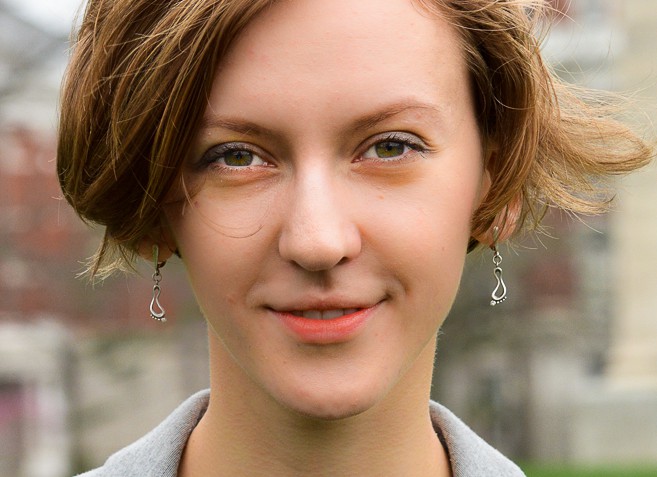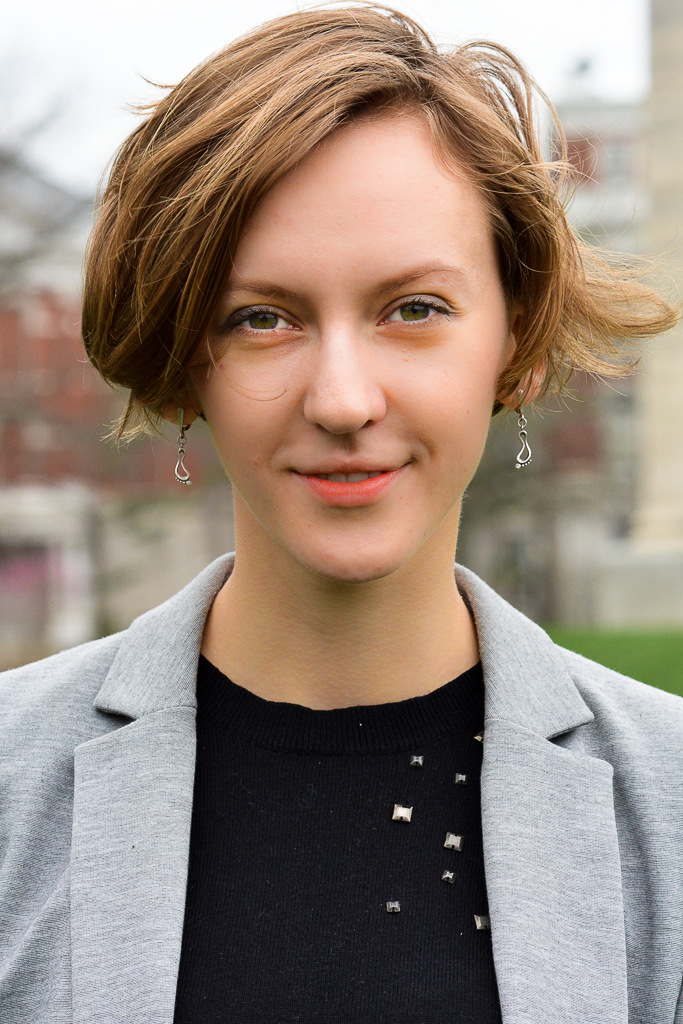OLENA GONCHAROVA
Kyiv, Ukraine | Reporter, Kyiv Post
Host: Pittsburgh Post-Gazette
—By Gokce Aytulu
Olena Goncharova was born close to nine months after the Revolution on the Granite paved the way for Ukraine’s independence from the Soviet Union.
“Our newborn country was poor, very weak in terms of the geopolitical situation,” Goncharova said.
She was slight and very shy during her childhood, when her country was going through a painful transition and people had to wait in long lines to buy food from nearly bare grocery shelves. But she always liked to write; “I never had problems writing essays in school.”
Olena Goncharova (oh LEN ah gahn cha ROVA) was a teenager during the Orange Revolution that forced democratic change, and she went with her mother to join the demonstrations. “I was still a schoolgirl but I felt … the need to participate even though I did not understand much about politics.”
She decided to become a reporter as a forced solution to her bashfulness. “I did not want to be that shy for all my life. I had very good friends in journalism; I followed their examples.”
Shortly before she graduated from college, when she was working part-time at the Kyiv Post, the EuroMaidan revolution ignited after President Viktor Yanukovych reneged on his promise to sign a trade pact with the European Union.
These protests on the city’s central thoroughfare, the Maidan, were much more violent than those previous. And Goncharova’s employer, the country’s largest English language newspaper, decided to give their cub reporter some extra protection.
“I had to wear a bulletproof vest for the first time in my life,” she recalled. “It was literally the scariest day of my life. About 50 people were killed in the streets of Kyiv and police were chasing protesters and journalists as well.”
Goncharova said all three revolutions started with student protests. “So I was in this strange situation. On one hand, I wanted to be a part of this as a student, but on the other hand I had to cover it as journalist. It was very difficult to keep objective this time. But you have to do your job, keep the news in balanced.”
The balancing act became even more difficult in the coming months.
Olena speaks with Global Journalist at the University of Missouri School of Journalism to discuss her experience as a reporter in conflict-stricken Ukraine.
Journalism in time of war
In 2014, the invasion by Russia and the war in eastern Ukraine was a huge shock for Ukrainians. “We could not believe it actually happened our country.” Goncharova said.
Russia and Ukraine have a history of conflict, but they did not expect the countries to go to war, an experience that she called “emotionally exhausting.”
Goncharova wanted to go the war zone to cover the fighting but her editor did not let her go.
So she started to write stories on war crimes, and the deaths of Ukrainian fighters.
“I was thinking what would be the best way commemorate these people.” It was not enough to just report the statistics of slain soldiers. “Most of them were my age or younger. It literally brought me to tears, when I was writing about young guys who left their parents, their schools and all the life they had. That was pretty heartbreaking.”
Goncharova became the only reporter in her newsroom doing profiles on the lost soldiers, which included interviews with family members.
Bringing all points of view into the stories on the warfare “was sometimes quite difficult,” she acknowledged. “Our chief editor says we should just do our jobs;, stick to high standards.” She made sure to interview government officials, opposition sources and people with conflicting views.
Goncharova also became a regular contributor to the Organized Crime and Corruption Reporting Project in Ukraine. She also wants to broaden her skill set.
“I’m interested in digital journalism strategies and multimedia news production models, especially in converged newsrooms,” Goncharova wrote in an essay.
“I’m certain that working in a U.S.-based newsroom will also add to my understanding of how the global economy works. I believe that reporting on these topics will help me to focus on the issues that require more coverage in Ukraine and effective techniques to do so.”
While Goncharova had to overcome her natural shyness to be an effective reporter, her name befits the profession.
When she was born, her mother favored Olga, but her father chose Olena, which means “light” in Ancient Greek. Now, it’s her job to enlighten people.
To lean more about Olena’s journey to the United States for here Alfried Fellowship fellowship click here.
For more on the fellows’ interaction with journalism students at the University of Missouri click here.




